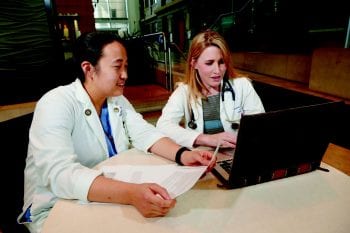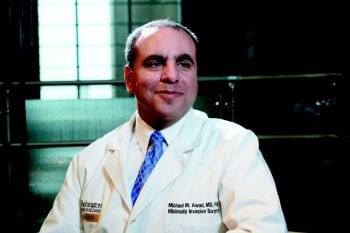Focus: Minimize resident burnout

The statistics are alarming: 29 percent of U.S. resident physicians experience depressive symptoms.*
In general surgery, in particular, a study conducted in 2016 by Washington University general surgery resident Leisha Elmore, MD, confirmed that chronic stress among surgical trainees is a real concern: 69 percent of U.S. surgery residents showed symptoms of burnout.†
With that benchmark, Washington University residents now are researching evidence-based solutions to the problem in order to bolster residents’ physical and mental health. Fourth-year surgical resident Lauren Barron, MD, has teamed up with Dehra Harris, MD, director of Wellness and High Performance for Graduate Medical Education, Washington University School of Medicine, to track residents’ heart rate variability and stress before and after interventions using a wearable device. They hope to gain insight into stress mitigation with measurable data and common scientific terminology.
Changes over the last few decades in trainee demographics, patient volume and acuity, and ACGME training requirements as well as duty-hour restrictions, have greatly altered the paradigm of surgical training. Nationally, a network of more than 60 organizations has formed the National Academy of Medicine’s Action Collaborative on Clinician Well-Being and Resilience. It is partnering with the Accreditation Council for Graduate Medical Education to study ways to reverse trends in clinician burnout. Earlier identification of when interventions are needed is key, as are stress-relief activities that can foster not only camaraderie, but also the sense of a better work-life balance.
At the 2018 General Surgery Residency retreat, Barron presented both humorous and more serious slides highlighting ways to harness negative feedback and build resilience. A “Resiliency Showcase” also enabled residents to share ways they unwind or cope, such as bicycling or playing a musical instrument.
The end goal is to maximize potential. “A sports team optimizes their athletes for performance,” explains Barron. “If residents can be kept from the effects of chronic stress, their ability to solve a clinical problem is that much greater.”
*Mata DA, Ramos MA, Bansal N, Khan R, Guille C, Di Angelantonio E, Sen S. Prevalence of Depression and Depressive Symptoms Among Resident Physicians A Systematic Review and Meta-analysis. JAMA. 2015Dec 8; 314(22):2373–2383.
†Elmore LC, Jeffe DB, Jin L, Awad MM, Turnbull IR. National Survey of Burnout among US General Surgery Residents. J Am Coll Surg. 2016 Sep; 223(3):440–451.
Highlights
Surgeon Michael Awad, MD, PhD, has been named Integrated Surgical Disciplines Clerkship director. He will oversee the 12-week integrated surgical clerkship for third-year medical students, as well as curricular and career development efforts for all medical students in surgery. Awad will build upon the current success of the surgery clerkship and plans earlier and more frequent exposure to different surgical specialties and subspecialties. Awad follows John Kirby, MD, who had held the clerkship director position since 2009.
The General Surgery Chief Resident Mentorship Award in the Department of Surgery has been renamed the Jeffrey Moley Faculty Mentorship Award. The award’s new name honors its first recipient, Jeffrey Moley, MD, former chief of the Section of Endocrine and Oncologic Surgery, who died in October 2017. Moley was admired among residents for his mentorship and had taken great pride in receiving the award when it was established in 2015 to honor the faculty member whom chief residents feel is most impactful to them. Minimally invasive
surgeon Michael Awad, MD, PhD, was the first to receive the award under its new name in June 2018.
General surgery research resident Emily Onufer, MD, MPH, won the 2018 Tools of the Trade award from the Association of Program Directors in Surgery (APDS). The award recognizes the APDS member who has created a high-quality surgical training curriculum. Along with senior author Laurie Punch, MD, Onufer developed the SAVE 1.0 (Surgery for Abdomino-thoracic ViolencE) curriculum, which addresses the anatomy of gun violence and the identification and repair of gun violence trauma.
